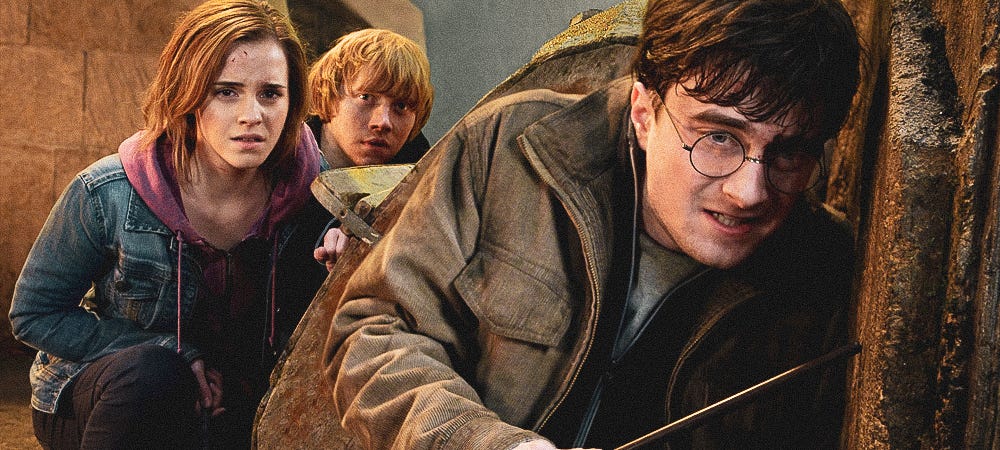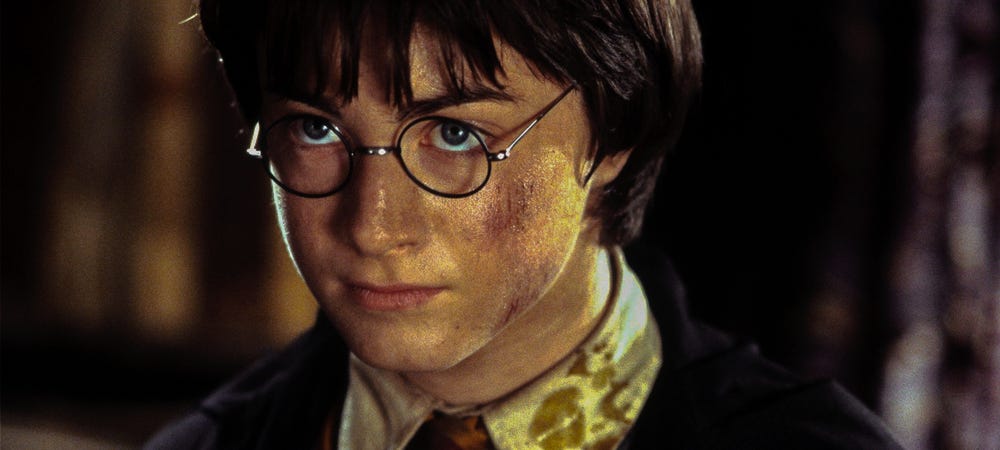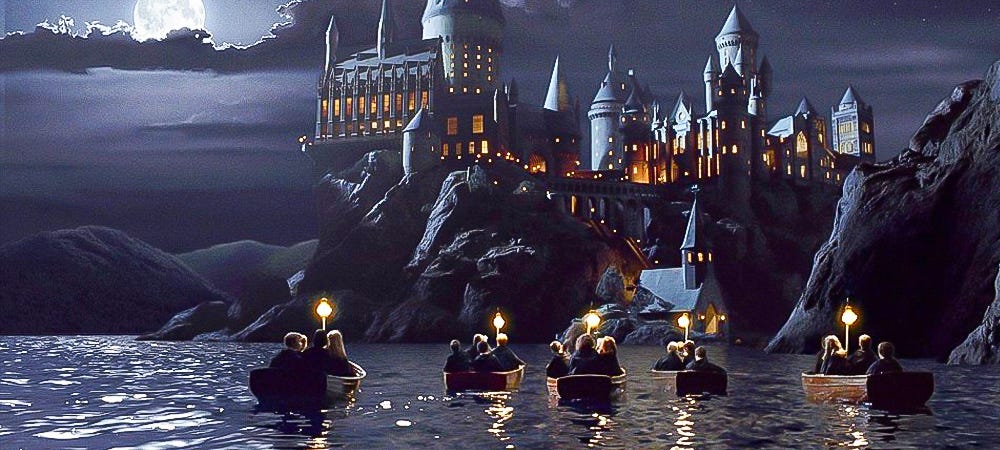is Harry Potter the 'last great myth'?
Watching the Harry Potter movies for the first time and wondering if J.K. Rowling is our generations' Lewis and Tolkien.
Over the past couple of months, I’ve watched all eight Harry Potter movies for the first time. Honestly, I could’ve gone without them.
Yes, I’m a 90s kid,1 a millennial, and I missed out on the biggest cultural phenomenon of my generation. I remember the blocks-long lines outside bookstores on Harry Potter release days. I remember the ditzy wave of anti-fictional-witchcraft sentiment among American Christians; it’s the culprit most responsible for J.K. Rowling’s stories never making it into my hands. Even as a teenager, when I began picking out books for myself at the library, I skipped Harry Potter; he was on the naughty list.
As an adult, I’ve been holding out until I can find time to read the books. I was supposed to make time this year to knock out two or three. It’s on my “Books to Read” list! But, alas, it is October, and I’ve yet to disturb the drowsy silence laying over the large, square houses of Privet Drive. In September, however, Netflix made all eight of the Warner Bros. film adaptations available on their platform, and I realized fate had pre-booked some movie time on my schedule. So I dove in.
Here’s what I mean when I say I really didn’t have to: There were no surprises in Harry Potter for me. I’ve known the basic movements of the story since a time I can’t remember. I’ve known that Harry is “The Boy Who Lived,” that his parents were murdered (as in all good stories with child protagonists), that he is the “chosen one” (even calls himself that), and that he dies in the end but comes back to life.
Before watching the films, I could name the houses of Hogwarts. I’m Ravenclaw, thanks for asking. I could tell you that Draco Malfoy doesn’t like Harry very much and that Harry marries Ginny (not Hermione) in the end. And I could pronounce Hermione correctly (because girls love to say they’re “like Hermione.”) I’d long before uttered the name of He Who Must Not Be Named. (A friend has taken to calling an ex-suitor “Voldemort” and has ordered us not to speak of him.) I could also tell you what Horcruxes are, that Voldemort’s soul is divided into seven of them, and that Harry is one.
Harry Potter has sunk so deeply into my context that I cannot navigate the world and avoid its influence. I’ve accompanied friends to shops selling Potter relics—don’t worry, I didn’t buy anything myself because, technically, I’m not a real fan. But I’ve conversed about the influence of Rowling’s work as though I were a fan. Because I am (really) and I see Harry’s mark light lightning everywhere. My first few times in London and Edinburgh, I saw so many people wearing red-and-gold scarfs that it seems the Sorting Hat thinks most of the world belongs to Gryffindor.
And that brings us back to the title of this post: is Harry Potter the last great myth? Well, is it? Is there another singular and complete story so thoroughly threaded through our cultural (Western?) consciousness that even those who have not directly experienced it feel some affinity for it and unity with it?
This question crystallized for me when listening to a recent episode of The Overthinkers podcast. The hosts interviewed Annie Crawford in an episode titled “Where Is the Modern Day C.S. Lewis and J.R.R. Tolkien?” J.K. Rowling’s name came up (naturally), with Crawford suggesting Harry Potter might be “the last great myth.”
[Harry Potter is the] last major work that had resonance across a broad demographic…since then we’ve started to fragment into our different niches.
Think about it: what modern story can compete? Star Wars or Star Trek might rise to the level of, but cannot surpass it. As much as I love the MCU, it is primarily a reinterpretation or reworking of older myths and a translation of archetypes. Harry Potter might be the most recent story that unifies so completely, enabling individuals and people groups to see themselves in it. Perhaps, to the collective literary mind, Rowling is the Lewis-Tolkien of our present generations (Millennials and Gen Z). This is not to say she replaces them, but that she embodied the macrospirituality of their great tales in her own writing without mimicking their style.
To be completely honest, I think this line of questioning—where is our Lewis? where is our Tolkien?—is suspect. Those inklings were people of their time, by their time, and for their time. To assume that writers and artists of today are insufficient for our time is a cross between chronological snobbery and appeal to tradition—and C.S. Lewis specifically warned against the former.2 This is not to say that the writers and artists of yesteryear cannot speak to our time. Quite the contrary, we wouldn’t talk about them if they didn’t minister to us. However, we (as writers, artists, makers, and stewards) speak to our time, to past times, and to the future. Chronology is conversation, and a voice from the past is not qualitatively more applicable than a voice from the present. But I digress.
When asking if a story is a myth—and a great one at that—we consider two aspects:
The story must escape its origins and demand to be retold. Admittedly, outside the plethora of Harry Potter fan fiction, this hasn’t happened. But it’s about to! Warner Bros., with Rowling on board, is planning a decade-long television adaptation of Harry Potter. Yes, many Potterheads (especially its original millennial readers and viewers) will decry it on principle. But this might be the start of many retellings and reinterpretations of the story, highlighting its versatility, applicability, and enduring qualities.
The story must transcend genre. It must also transubstantiate—its plot and its characters must matter for something more than their place in the story; they must demonstrate transcendent, spiritual value. A great myth has chimerical and alchemical qualities. I’ve read many a fantasy or science fiction story that aspired to nothing higher than being a fun, action-filled tale. Such stories are enjoyable and have their place. But a myth isn’t about enjoyment—watching Harry Potter was sometimes torture! A myth must capture ineffable treasure and torment, making it graspable for the apprehenders of that story. The Lord of the Rings is a great (and, perhaps, the best) example of this.
I’ll say one last thing: a real myth works backward and forward. That’s why I said starting out that I could have done without watching the Harry Potter movies. I have seen the truth and beauty which underlies that story via other stories, other panes in the stained glass masterpiece that is the Reality about our world and our existence in it. But a myth loses none of its power if I’m already familiar with the ur-myth. I knew the truth of Harry Potter before knowing the facts of his story. But the result is the same as if I had learned the facts while watching the story and, via the facts, learned the truth. That’s how myths work: they reveal truth by concealing it, wrapping it up in the sinew of story.
Now, on to fun stuff. Here’s a thought collage—a collection of things that jumped out as I watched Harry Potter.
there’s so much meanness
I was genuinely shocked by the amount of meanness and violence in the films, especially the utter cruelty of the Dursleys. I had heard that Harry Potter lived in a cupboard under the stairs but I was still shocked to see it on screen. Also, the bullying and name-calling among students: of course, it’s always the characters we’re meant to think are bad who are throwing insults around, especially Draco Malfoy. Obviously I haven’t watched All The Movies, but I feel there’s no way films made for young people today would allow this kind of blatant bullying and meanness without having people sign a sensitivity waiver or something.
Still, the display of unsubtle evil and plain badness might be something we need more of in our media. How did all our big fictional baddies become so attractive? Even serial killers are painted with a brush of sympathy.
atmosphere is king
This doesn’t get talked about as much as it should, but Hogwarts (when it’s not under attack) feels like the sort of place you want to be. The paintings talk. The staircases move. There’s lots of books. You might discover a magical creature on the grounds. It’s not all about plot and character development, guys. It’s about atmosphere. Sometimes, you just want things to be, and you want to inhabit those things.
Snape is my favorite
I thoroughly enjoyed Alan Rickman’s portrayal of Severus Snape, partly because he’s the one character who kept me on my toes. Snape’s the guy everyone assumes is bad but is actually quite good—good in the ancient, mysterious, chaotic way, seemingly lost in an era of niceties and politeness.
where’s Voldemort?
He-Who-Must-Not-Be-Named has made quite a name for himself in pop culture, so I expected quite a lot of him in the films. However, his presence was not so present. That’s surprising.
Harry is sooo good
Harry has flaws, but he is consistently, breathtakingly good, especially to those trying to kill him. Which, if you didn’t know, is extremely hard! Harry stares hard into the abyss and the abyss stares back. Yet he still goes out of his way to save Draco from the fiendfyre in the Room of Requirement. He is also good to Snape without knowing that his Potions professor turned Defence Against the Dark Arts instructor turned Headmaster is actually on his side.
That’s all about Harry for now. One of these days, I’ll get around to reading the books.
asides + signal boosts
To say a lot is happening in the world at the moment is an understatement. But I’ve been reading about the horrific and tragic events of the current Israel-Gaza conflict, and I trust that you’re praying for a swift end to the present violence as I am.
I’m grateful for something
wrote about hope: “Confronted by…the evil we witness today, appeals to peace and hope can risk sounding trite and insincere.” True. We can feel utterly and entirely helpless during this time. But she also talks about something we can do:Perhaps for now, as the fighting continues, something we can do is develop what Arthur Cohen describes as ‘a new language … in order to destroy the old language which, in it’s decrepitude and decline, made facile and easy the demonic descent.’ This is the task that now faces those who write stories or poetry, for people who report news and raise children; we must engage with the re-envisioning of the world as it should be.
Krista Tippett’s interview with Kerry Washington. Highly recommend giving this a listen. It’s about understanding self through story, even through enacting the stories of others. It’s about wearing masks and performing even in the context of community and family. Even though she’s talking about herself, I started thinking about myself while listening.
Finally, I enjoyed many of the new versions of songs on Switchfoot’s 20-year Beautiful Letdown Deluxe Album.
Although I’m not so in love with the cultural ephemera of the nineties as some of my generational siblings are. Likely because I missed out on so much of it.
Yes, I know “chronological snobbery” technically refers to the idea that art and culture of earlier times is inferior to our own, but a chronology (a timeline) runs in both directions and we can be just as snobbish about the past (thinking it’s superior to our own) as we can about our own time. Also, I can’t think of a better term to describe what I’m getting at.









Daniel- This is a great question. I've thought about it too. Not even from a movie perspective. But also from the perspective of: "Which books should I keep on my bookshelf, versus. which should I toss this year?" And for me, if it remains on the bookshelf--it gets higher and higher into the 'classics' or 'epic' category. Perhaps both surprisingly and unsurprisingly, Potter remains on the bookshelf.
On a side note, I think it's so very interesting that you knew the story line before having ever read the books. It does seem impossible to keep the ending of this series a surprise to those who haven't read it. I'm giving my daughter the books a little at a time (she's only read through book three) because book four and up are a little too dark for her. But it's so frustrating that some of her friends/ or just people that she meets have seen the movies and have told her the ending!
I quite literally grew up with Harry. I read book one at age 11 and then swallowed books two and three. When I became a teenager Rowling was putting out about one a year and I'd be up at midnight at the bookstore to purchase my copy. I love that I didn't get to know the ending until I read that last book. (Though my BFF's dad finished it a few hours before me, and nearly spoiled it for reasons I will never understand!)